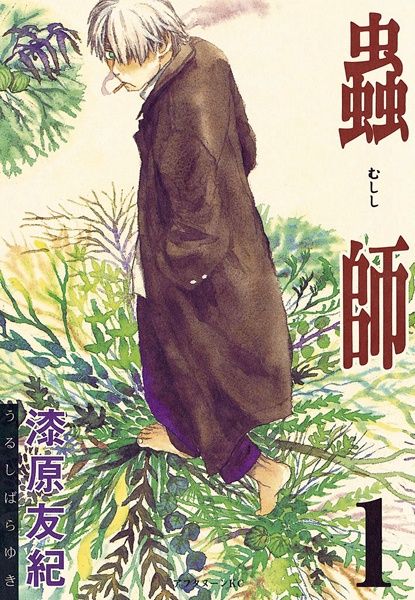
Mushishi is a unique and contemplative series that transcends traditional storytelling. At its core, it explores the enigmatic world of “mushi,” beings that exist beyond the ordinary perception of humans, embodying life in its most primal and indifferent form while on the peripheral it explores the peculiar relationships between the humans and the mushi.
The series follows Ginko, a traveling Mushi-shi, whose quest for rare mushi sightings intertwines with his mission to help those affected by these mystical beings. Ginko’s role is not that of a traditional hero driving the narrative forward but rather that of an observer, guiding the audience through the mysterious and often inexplicable world of mushi. His interactions reveal deep philosophical and moral themes, reflecting on the interconnectedness of nature.
Mushi
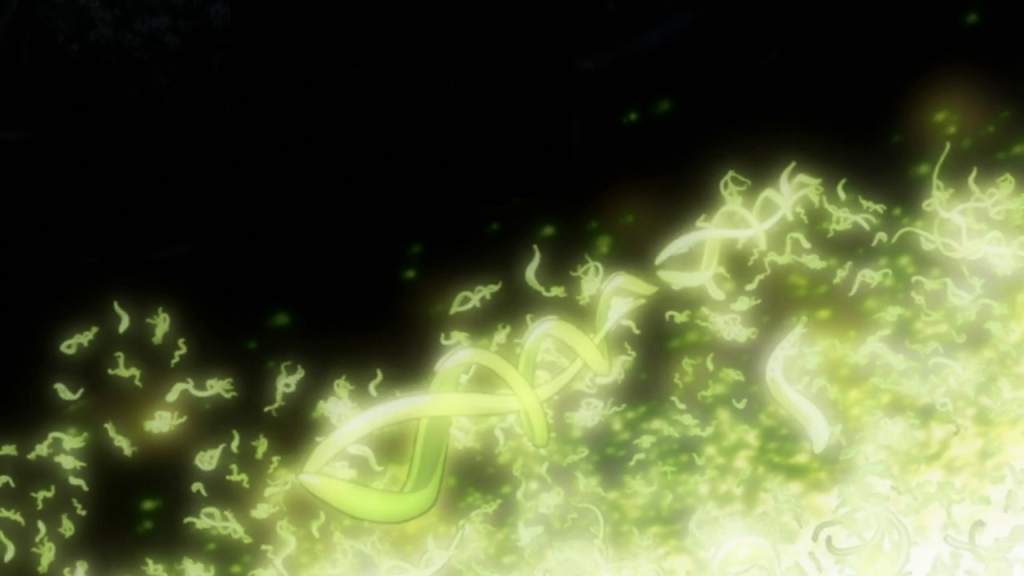
Mushi have been described as “life in its purest form.” These entities are neither good nor evil; they simply exist and strive to live, much like any other creature in the natural world. The mushi are an extension of nature itself, simply trying to exist like any other entity in our world, even if it may have a negative consequence for those who come into contact with them, such as humans.
The influence of Mushi on humans varies from being beneficial to harmful to extremely malicious. It’s important to note that not all Mushi are malevolent, despite their dangerous effects. Like most parasites, they are just trying to survive. This is highlighted by Ginko, who devotes his time to assisting people and Mushi coexist peacefully, instead of exterminating mushi like the majority of other Mushishi.
The series is episodic, with no two stories featuring the same mushi, creating an array of mystery behind each story. Some mushi, like ‘Ah’, are harmless and eat the silence created by the ‘Un’ mushi, which consumes sound when infested in a person’s ear. These mushi can be easily dispelled by covering your ears and slightly moving the wrist to make noise, and with brine (salt dissolved in hot water), respectively. However, there are also harmful mushi, such as ‘Kairo’, which puts out a smell to lure in creatures and traps them in a time loop, causing them to repeat the same life over and over again until they are assimilated into the mushi. While mushi usually target small creatures and bugs, sometimes humans become intertwined in their existence and become the subject of their fate.
Ginko
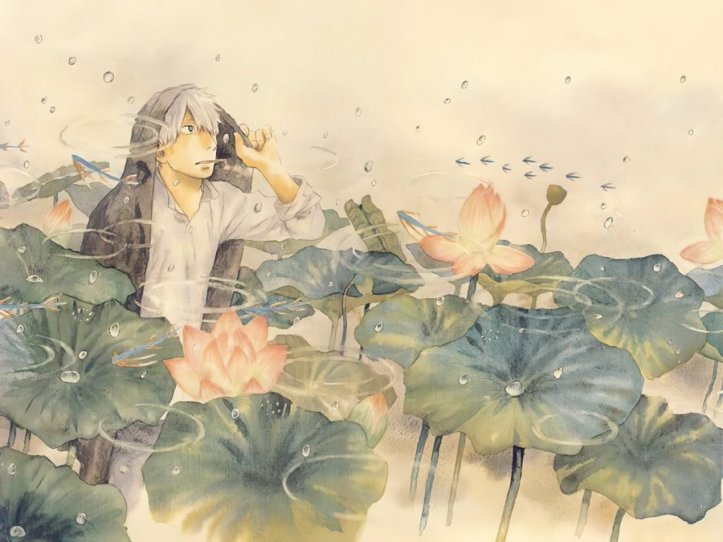
Ginko is the heart and soul of Mushishi. He’s always in constant travel due to curiosity and necessity. As someone deeply connected to the mushi, he cannot settle down without risking drawing mushi to inhabited areas, potentially causing harm to others. He also travels driven by his quest to study and understand mushi. Through his eyes, we explore a world where the mystical and the mundane coexist. Through his journey, we are reminded of the beauty and complexity of life.
His journey is solitary, yet he never appears lonely. Ginko’s interactions with the people he meets are fleeting but impactful. He forms temporary bonds, offering his knowledge and assistance, and then moves on, leaving behind a trail of stories and lives touched by his presence. His approach to helping is marked by a delicate balance of intervention and non-interference. Ginko understands that mushi, like all aspects of nature, have their place and purpose. It’s interesting to note that while Ginko appears in every chapter, he is often depicted as a side character. He intervenes only when necessary to restore balance or alleviate human suffering, often opting for solutions that harmonize with the natural order rather than disrupting it.
Despite his calm exterior, Ginko carries the weight of his experiences. His encounters with mushi and the people affected by them are not just professional endeavors but personal quests for understanding and redemption. While there are only a handful of stories about his past, it also helps build an air of mystery around him. In Mushishi, Ginko’s protagonist lies in his quiet dedication to his craft and his unwavering commitment to understanding the natural world as somewhat of a mediator between humans and mushi.
Stories & art
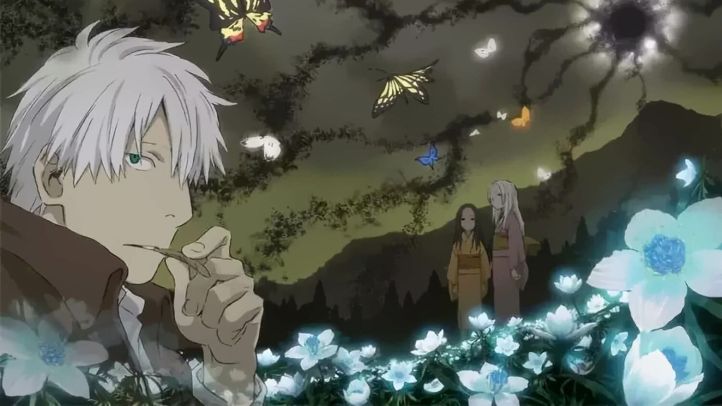
Mushishi’s strength lies in its subtle commentary on the connections between humans and nature. It emphasizes the importance of patience and a broader perspective on life’s challenges. The series does not rely on dramatic arcs or a singular plotline but instead offers a collection of profound, standalone stories. This approach allows for varied endings—some happy, others bittersweet—reflecting the unpredictable nature of life itself while the overarching lesson seems to be that we should appreciate what we have and not cling when the time comes to move on.
While Mushishi’s art in manga falls slightly flat of what one would expect for such complex stories, the animation by ARTLAND complements its storytelling, growing in sophistication over time and beautifully capturing the essence of its world. The series does a masterful job of intertwining the real life with the fictional world of mushis. Another great thing about the anime is the calming yet sometimes haunting soundtrack by Toshio Masuda. The OST is different each story yet feels so connected making the stories from a rather bland manga come to life.
Final thoughts
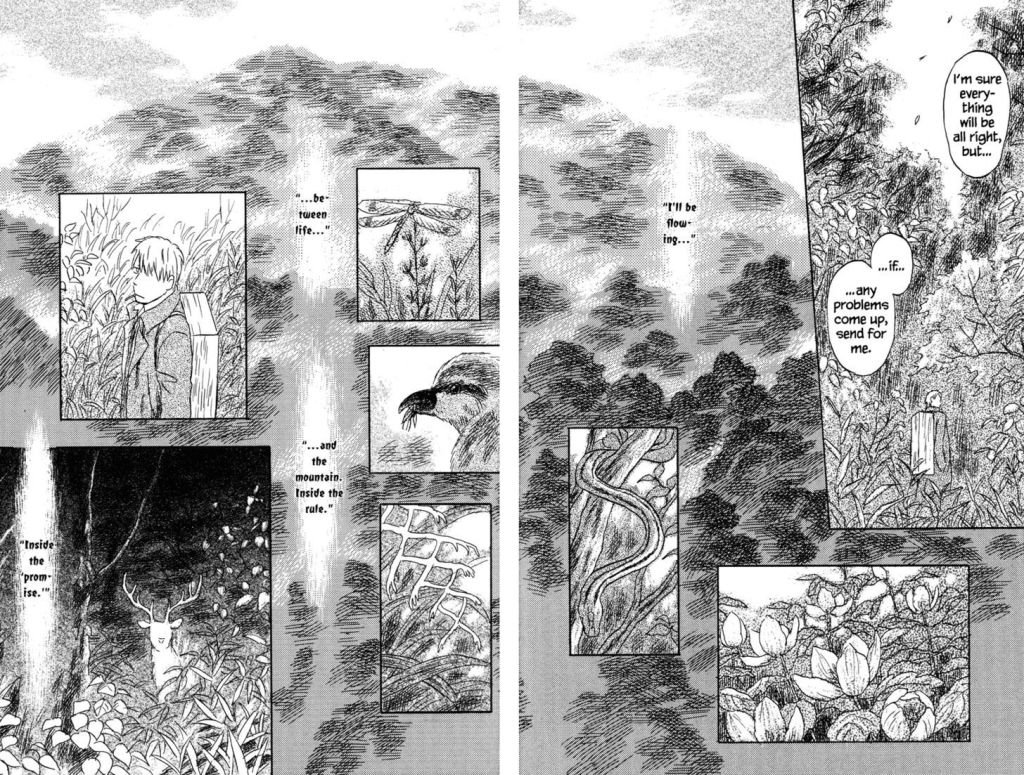
This is another series that defies conventional expectations, offering a rich narrative full of mythological influences and human motives. It was a refreshing change for me to read a manga that is more slow-paced and philosophical with all the Shonen stuff releasing weekly. This is certainly not a series that can be binged. With a different story in each episode, you have to pause to take it all in, which works in a weirdly good way. This series could have easily been monotonous with its relatively simple premise (like ‘Aria’), but it turned out to be something special with the way the different stories are written, even with the same core premise.
Also might get the artbook one day if available, looks really beautiful!!
Rating: 9/10
TL/DR: Watch the show 🙂
Edit: Just realized my first impressions were from 3 years ago😭
I really liked the anime too. Own it on dvd but don’t know that I like it enough to upgrade to the bluray.
LikeLiked by 1 person
That’s awesome that you own it on DVD! I totally get not wanting to upgrade to Blu-ray unless you’re really into it. Sometimes DVD is cool enough.
LikeLiked by 1 person
Great post – this series is amazing, one of my favourites. I agree with you about the contemplative tone, yeah.
LikeLiked by 1 person
Thanks!!
LikeLiked by 1 person